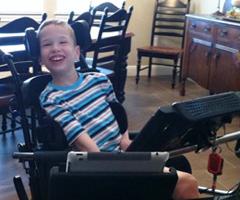Christmas iPad, Digital Books and Portable Reading App Opens New World of Learning for 7th Grader
 Last Christmas, one of the presents Connor Meadows unwrapped first was an iPad and within days this 7th grader with cerebral palsy was reading digital books on his own. He didn’t have to worry about the book falling or asking someone to turn the page for him. “The learning process took on a whole new meaning,” said his mom, Casey Meadows. “We cannot download digital books fast enough and he loves to read now!”
Last Christmas, one of the presents Connor Meadows unwrapped first was an iPad and within days this 7th grader with cerebral palsy was reading digital books on his own. He didn’t have to worry about the book falling or asking someone to turn the page for him. “The learning process took on a whole new meaning,” said his mom, Casey Meadows. “We cannot download digital books fast enough and he loves to read now!”
In 2012, Connor’s mom learned about a free online library, Bookshare and a portable reading app called Read2Go, for Apple devices (under $20). She began downloading digital accessible books on behalf of her son through an individual membership.
Accessible books enable learners, like Connor, to more easily follow highlighted words on a computer screen and listen to text read aloud. Readers can use the technology device to navigate through chapters, bookmark pages and select preferences such as background colors, male or female voice and size of fonts.
Bookshare is federally funded through awards made by the U.S. Department of Education, Office of Special Education Programs. The service is free for U.S. public schools and students who qualify with print disabilities. His mom says, “Connor has more freedom to learn anywhere and fewer physical burdens. He also gets his school books on time!”
Digital accessible books can transform the learning experience for students who are blind, have low vision, a severe reading disability or physical disability. The multi-modal (to see and hear) experience allows readers to take in more complex information in middle and high school. “As Connor’s reading skills improved, so did his communicate,” shared Meadows. “His sentences got longer using his Dynavox and head switch.”
In the past, Connor depended on his mom or an aide to hold a book steady or turn a page. His reading assignments had to be requested in large print, but that often took weeks – which left him always in catch up mode. Now, he doesn’t rely on others much and reads digital books from a stationary stand on his wheelchair from his iPad. “He can follow the text and has better eye tracking,” adds Meadows.
Last year, Meadows met with her local school to talk about the advantages of digital books and technologies. She shared information about a local Bookshare training program, Accessible Books for Texas (ABT) and encouraged the school to apply for an Organization Membership.
The Texas school ran with the suggestion and worked with an ABT Outreach Coordinator who demonstrated how the library worked. Educators learned how to download eBooks in formats such as DAISY (Digital Accessible Information System) and Braille (BRF) and how text-to-speech (TTS) worked. There are several free reading technologies with a Bookshare membership.
“Digital books and technologies can improve the learning experience for any child – whatever their reading level or disability,” said Meadows. “Some educators think that if a student hears text read aloud, they aren’t learning, they are just listening, but this isn’t the case. When Connor listens to an e-book, he follows along with the highlighted text and understands the story. He also uses the navigation tools to review school reading assignments for reinforcement.” She recently downloaded three novels for Connor’s English class from Bookshare: Lawn Boy, by Gary Paulsen, Fever 1793 by Laurie Halse Anderson, and The Cay, by Theodore Taylor. Now, he doesn’t worry that this book will fall off his stand or he’ll lose his place due to lack of eye coordination. “Just when I think that he isn’t learning, I’ll ask him a question and he recalls the information,” said Meadows, “that’s what I call opening up a new world of learning!”